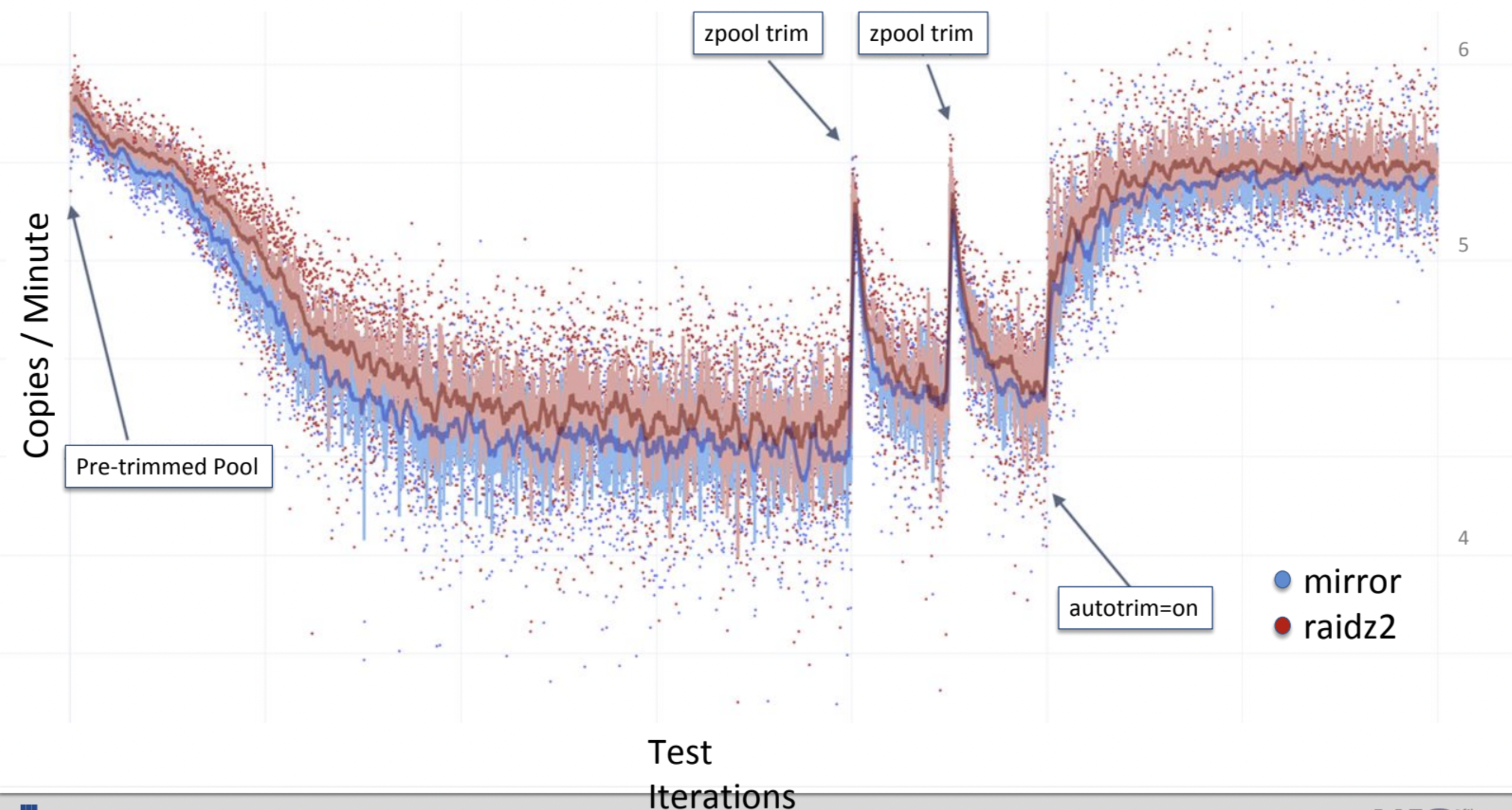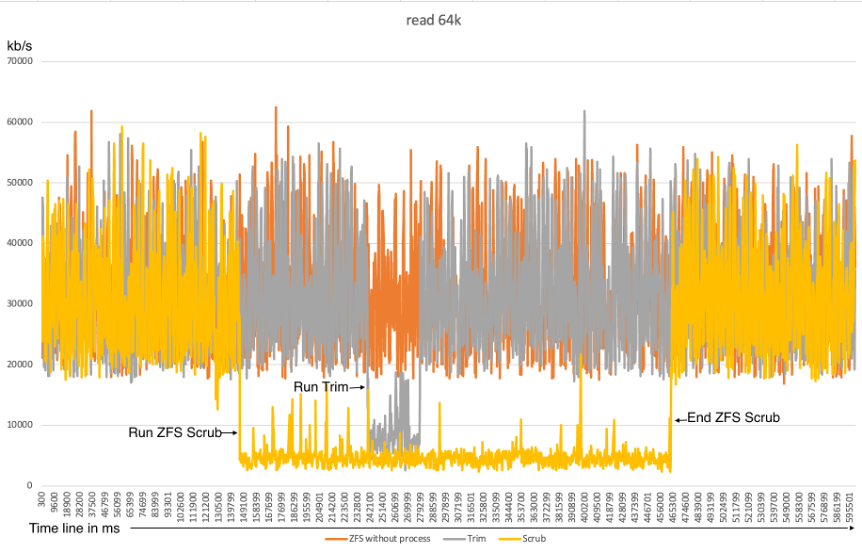Motivation
When using physical SSDs in a ZFS configuration, write performance degrades over time when the storage
system is used for a long time. This problem occurs due to the nature of the SSD. Depending on the type
of SSD and how long that drive is loaded, the negative impact on write performance can be significant.
To solve this problem, ZFS supports the TRIM feature, which helps prevent performance degradation of SSDs.
There is also a need to periodically check the integrity of the data in EVE in the ZFS configuration using
the Scrub function. This verification is necessary in order to detect and prevent errors before they cause
hardware failure or data corruption in EVE, which is not acceptable to us.
The requirement to be able to maintain the storage system and periodically check it for errors comes from
EVE customers and also is in line with the requirements for improving the storage system in EVE.
And this proposal is to add the ability to instantly launch or schedule these commands on the controller side.
Since commands can negatively affect performance in the course of their work, it is proposed to add
the ability for users to set the time for their launch themselves through the controller.
TRIM
TRIM is a command which allows the filesystem to notify the storage device which blocks are no longer in use.
Сan read more about what TRIM is on the wiki.
This functionality is already implemented in OpenZFS and all we need is to add the ability to control this
through the controller.
The benefit for EVE that we get after implementing the ability to run this command from
the controller is the following:
- Reduced write amplification (fewer writes)
- Higher write throughput (less read-erase-modify)
- Increased device longevity (finite erase-write cycles)
An example of the positive impact of the TRIM team was presented at the OpenZfs conference in 2019 in the
presentation of this functionality:
SCRUB
ZFS checksums every block of data that is written to disk, and compares this checksum when the data is read back
into memory. If the checksums don’t match we know the data was changed by something other than ZFS
(assuming a ZFS bug isn’t the culprit), and assuming we are using ZFS to RAID protect the storage the issue
will be automatically fixed for us.
But what if you have a lot of data on a disk that isn’t read often? ZFS provides a scrub option to read back all
of the data in the file system and validate that the data still matches the computed checksum. This feature
in EVE can be accessed by running the zpool utility with the “scrub” option and the name of the pool to scrub.
In this proposal, it is proposed to add functionality that allows you to run this function from the controller,
including according to the schedule.
Weak sides
The weak side is the fact that performance decreases when executing these commands since for their execution they,
like everyone else, require resources.
A study was also conducted to determine the negative impact on performance when reading and writing at the time
of executing these commands. And it turned out that both commands in the process of their execution show a decrease
in performance on the device by at least half when reading from disk or zpool. And only the Scrub command has
a negative impact on system performance when writing. The scrub operation consumes all I/O resources on the system.
There are levers in ZFS to limit these commands in system resources, but another big new study is needed to test them.
After which it will be possible to think about improving this functionality in EVE.
EVE API Additions
The StorageCmdConfig message is expected to be received from the controller:
// StorageCmdType is the type of command for servicing the storage system
enum StorageCmdType {
STORAGE_CMD_TYPE_UNSPECIFIED = 0;
STORAGE_CMD_TYPE_TRIM = 1; // Command for Trim ops
STORAGE_CMD_TYPE_SCRUB = 2; // Command for Scrub ops
}
// StorageCmdRunType - type for determining the frequency of commands running
// when servicing the storage system
enum StorageCmdRunType {
STORAGE_CMD_RUN_TYPE_UNSPECIFIED = 0;
STORAGE_CMD_RUN_TYPE_NOT_RUN = 1;
STORAGE_CMD_RUN_TYPE_NOW = 2;
STORAGE_CMD_RUN_TYPE_EVERY_HOUR = 3;
STORAGE_CMD_RUN_TYPE_EVERY_3_HOURS = 4;
STORAGE_CMD_RUN_TYPE_EVERY_6_HOURS = 5;
STORAGE_CMD_RUN_TYPE_EVERY_12_HOURS = 6;
STORAGE_CMD_RUN_TYPE_EVERY_DAY = 7;
STORAGE_CMD_RUN_TYPE_EVERY_2_DAYS = 8;
STORAGE_CMD_RUN_TYPE_EVERY_3_DAYS = 9;
STORAGE_CMD_RUN_TYPE_EVERY_WEEK = 10;
STORAGE_CMD_RUN_TYPE_EVERY_2_WEEKS = 11;
STORAGE_CMD_RUN_TYPE_EVERY_MONTH = 12;
STORAGE_CMD_RUN_TYPE_EVERY_3_MONTHS = 13;
STORAGE_CMD_RUN_TYPE_EVERY_6_MONTHS = 14;
STORAGE_CMD_RUN_TYPE_EVERY_YEAR = 15;
}
// StorageCmdConfig describes the desired command configuration for serving storage.
message StorageCmdConfig {
string pool_name = 1;
StorageCmdType cmd_type = 2;
StorageCmdRunType run_type = 3;
}
From the EVE side, a message StorageInfo with information about the current state of the commands will be added to
the message StorageServiceCmd with information about the state of the storage system:
// StorageServiceCmd - information about servicing storage systems (Trim/Scrub)
message StorageServiceCmd {
org.lfedge.eve.config.StorageCmdType cmd_type = 1; // Scrub or Trim
org.lfedge.eve.config.StorageCmdRunType run_type = 2; // The run instruction (time period)
uint64 last_update_time = 3; // Time of the last scheduled start check
uint64 next_run_time = 4; // The time when the command will be run next
uint64 last_change_cmd_run_type_time = 5; // The time the command was last modified
repeated uint64 launch_times_history_list = 6; // Stores history of previous runs
}
Reducing performance impact when running TRIM and Scrub
At the moment, there are not many options for these commands to regulate the resources used.
Only those options with default value that affect performance will be described here.
For Scrub:
zfs_vdev_nia_delay=5 (int)
For non-interactive I/O (scrub, resilver, removal, initialize and rebuild), the number of concurrently-active I/O
operations is limited to zfs_*_min_active, unless the vdev is "idle". When there are no interactive I/O operations
active (synchronous or otherwise), and zfs_vdev_nia_delay operations have been completed since the last interactive
operation, then the vdev is considered to be "idle", and the number of concurrently-active non-interactive
operations are increased to zfs_*_max_active. See ZFS I/O SCHEDULER.
zfs_vdev_nia_credit=5 (int)
Some HDDs tend to prioritize sequential I/O so strongly, that concurrent random I/O latency reaches several seconds.
On some HDDs, this happens even if sequential I/O operations are submitted one at a time, and so setting
zfs_*_max_active=1 does not help. To prevent non-interactive I/O, like scrub, from monopolizing the device, no more
than zfs_vdev_nia_credit operations can be sent while there are outstanding incomplete interactive operations. This
enforced wait ensures the HDD services the interactive I/O within a reasonable amount of time. See ZFS I/O SCHEDULER.
zfs_vdev_scrub_max_active=3 (int)
Maximum scrub I/O operations active to each device.
zfs_vdev_scrub_min_active=1 (int)
Minimum scrub I/O operations active to each device.
For TRIM:
zfs_trim_queue_limit=10 (uint)
The maximum number of queued TRIMs outstanding per leaf vdev.
zfs_vdev_trim_max_active=2 (int)
Maximum trim/discard I/O operations active to each device.
zfs_vdev_trim_min_active=1 (int)
Minimum trim/discard I/O operations active to each device.
Investigating performance when changing options
Explanations for the chart:
This graph depicts 3 read performance tests under the same conditions and shows the impact of TRIM and Scrub
commands on performance during these tests.
- The orange color indicates a test in which no commands were executed, i.e. clean test.
- The gray color shows the test in which the TRIM command was run, so we can observe short a performance drop when running this command.
- The yellow color shows a test in which the Scrub command was run, which resulted in performance degradation on most of the test.
Thus, this graph gives a visual understanding of the impact of the TRIM and Scrub commands on the performance of read operations.
TRIM command
The problem with this command is that a significant performance drop (more than 50%) occurs only for
the read performance when it is executed. For this command, after testing and checking, it was determined that changing
only one zfs_trim_queue_limit option to a value of 5 reduces the drawdown to 30-35%. Changing the rest of
the trim_min_active and trim_max_active commands does not produce a positive effect, since they are already
at their minimum values. The Trim command has almost no effect on write performance (Permissible performance degradation within 5 - 7%).
Recommended value for set in EVE:zfs_trim_queue_limit=5
Scrub command
The scrub command has a strong impact on both read and write operations. Moreover, if the zpool is large,
it can take a long time, which is a very critical factor for us (performance drop for a long time).
There are 2 ways to solve this:
- Increase the limits, with the expectation that the sooner we finish, the sooner we will return to normal mode.
This option can hang all I/O from applications, so this is not suitable for us. - Or, lower the available limits for this command as much as possible, and in this case, the process will be significantly
delayed, but the performance will be eaten up by 60 - 70% less than on the default settings.
The average here is difficult to achieve since there are not many options that can affect this.
Recommended value for set in EVE:
zfs_vdev_scrub_max_active=1
zfs_vdev_nia_credit=1
Discussion
- Do we want to be able to pause these commands through the controller?
- The EVE API Additions topic suggested options for time periods to automatically run these commands on a schedule.
If you have any objections or suggestions, let's discuss them in the comments.

